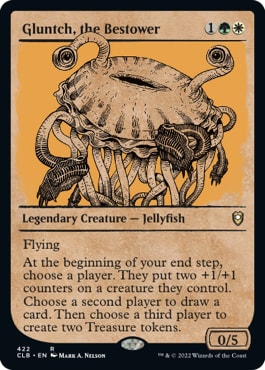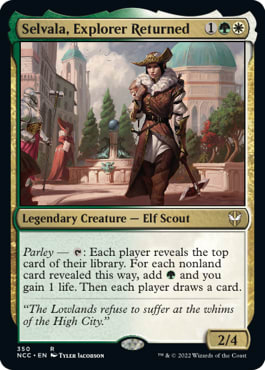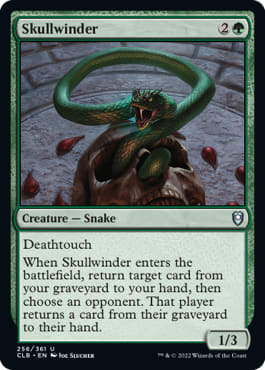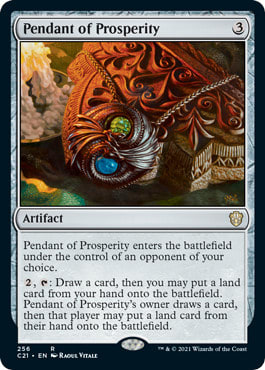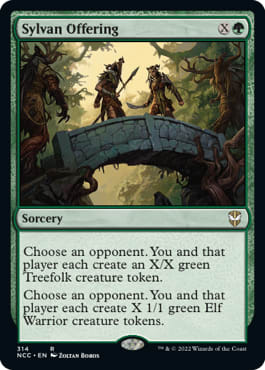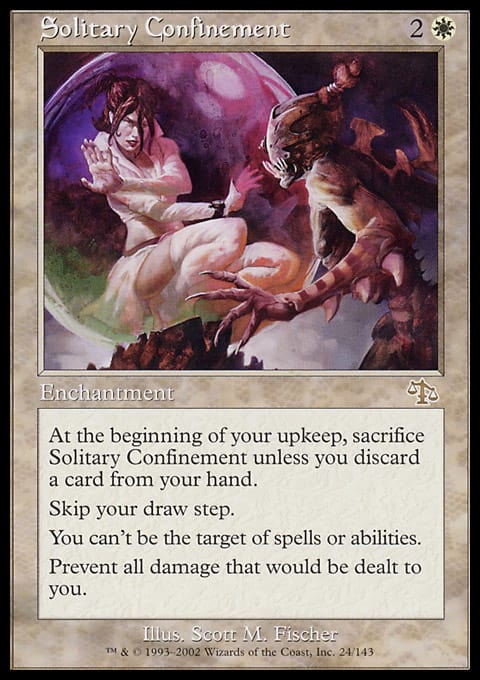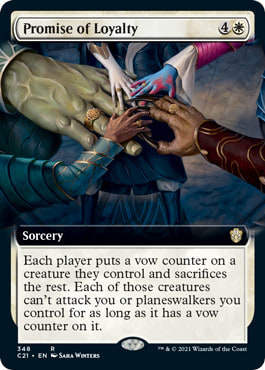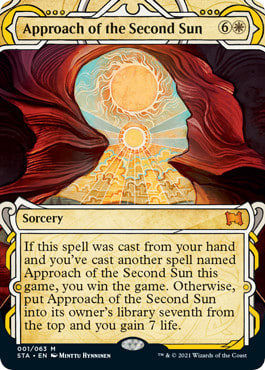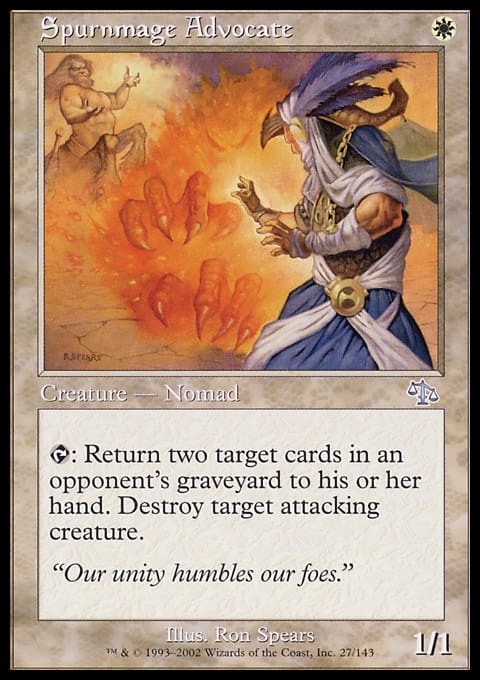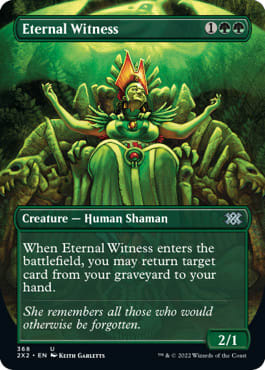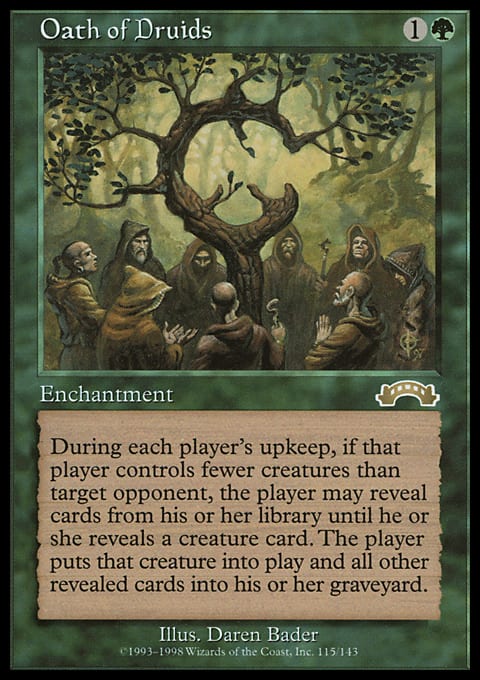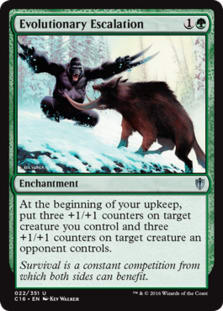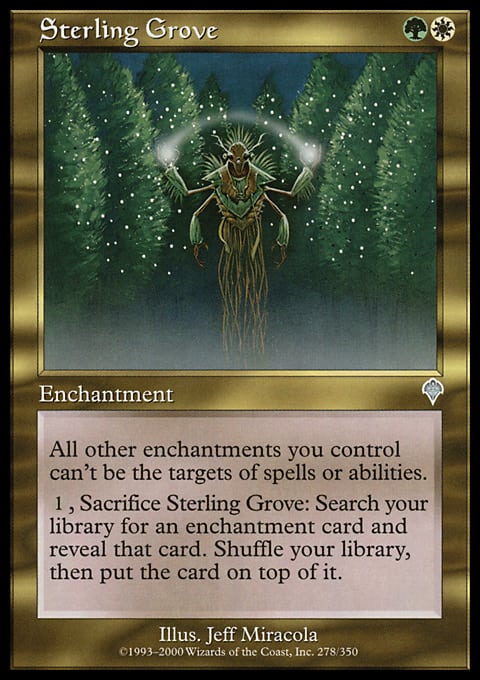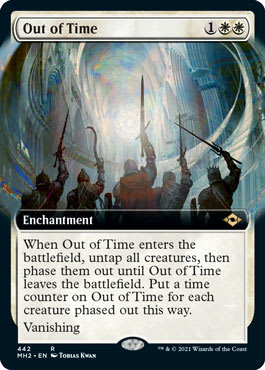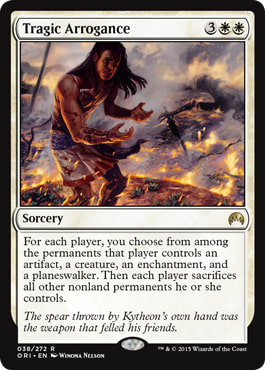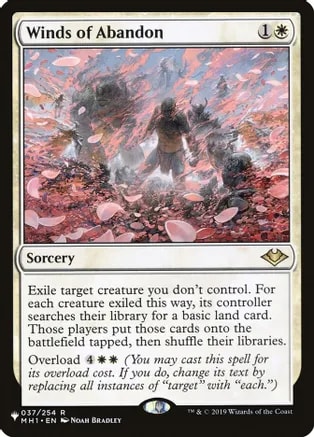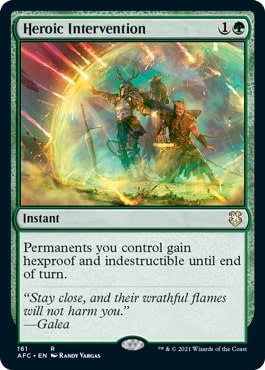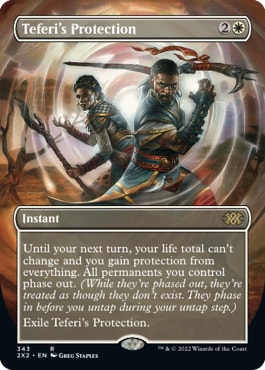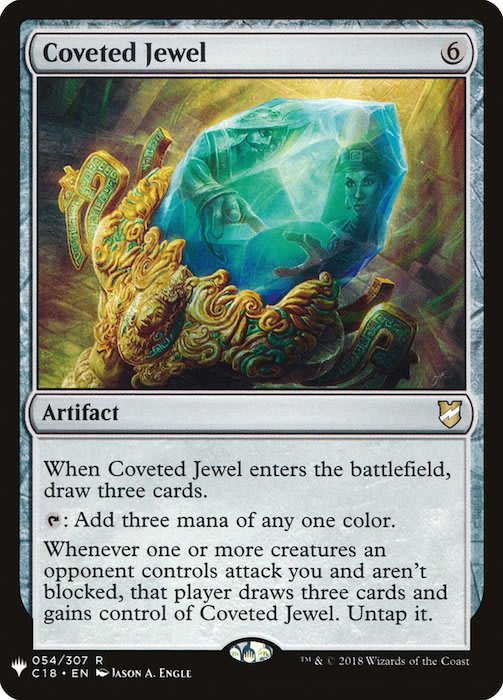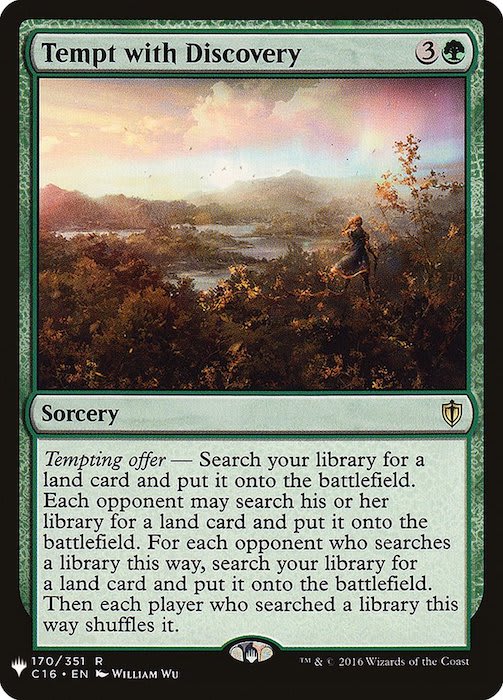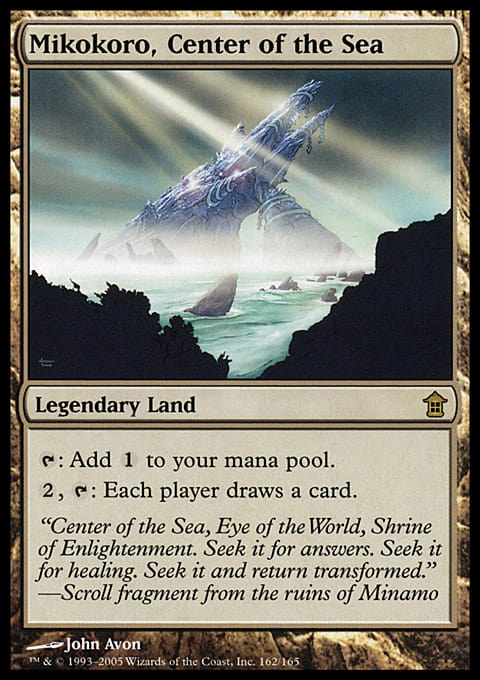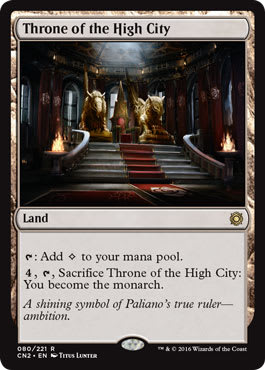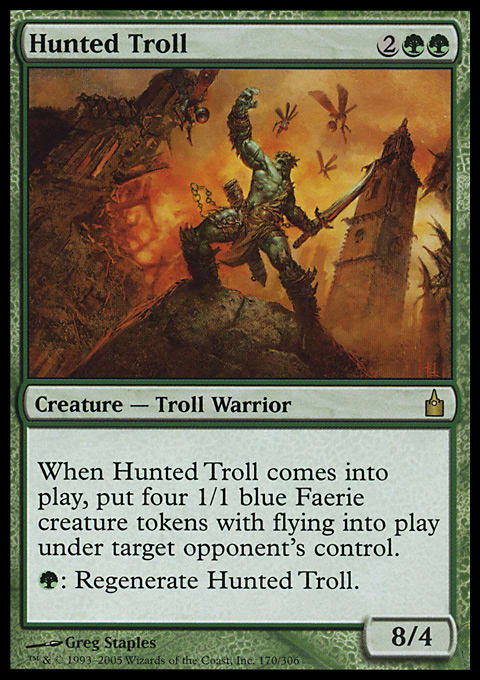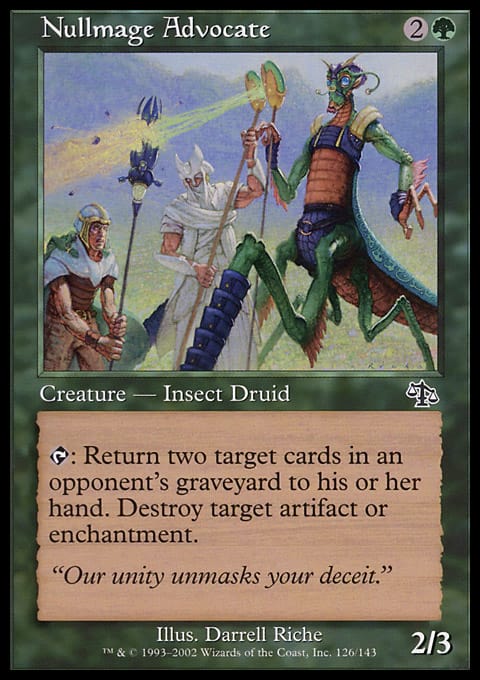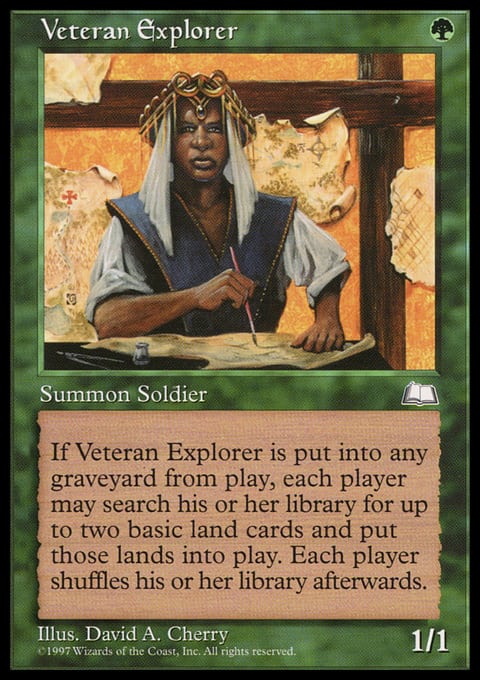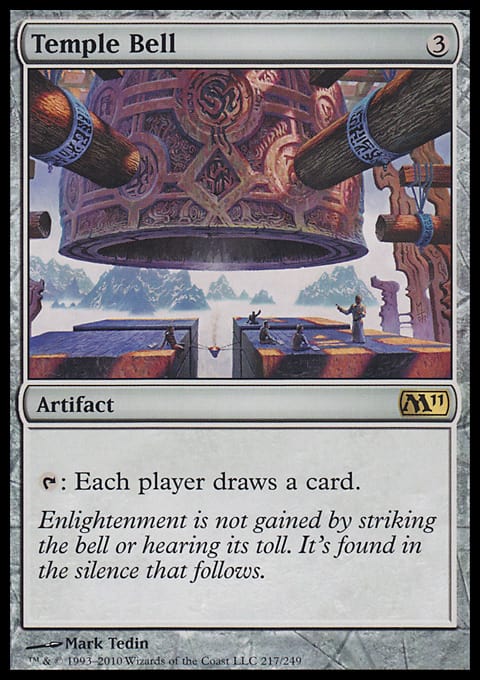
You know, the Commander table can be a pretty violent place. When we're not trying to infect each other with a Phyrexian plague, we're instead trampling the opposition with behemoths. Or roasting them alive with dragon fire. Perhaps having our army riddle them with arrows? Letting vampires indulge in their legendary thirst? There are just as many varied and grisly ways to vanquish a player in Commander as there are cards to vanquish them with.
Maybe it's time for a little kindness. Some generosity to cast a ray of sunshine over an otherwise bloody battlefield. Oh sure, at the end of the day, we'll still seek to win, but that doesn't mean we can't make friends along the way. The political aspect of Commander is far too easily overlooked as more and more powerhouse-style cards are printed. A Smothering Tithe may put you ahead on mana, but you can bet no one's gonna be willing to make a deal with you and your sea of impending treasures. On the flip side, if you were to gift them treasures, we'd be telling a different story. Help a player out, even an enemy, and you may find yourself a temporary ally.
On a wider scale, if your strategy expands further to help the entire table, the hope is that opponents will thank you for your philanthropy by going after each other. All the while, you can sit back, rake in value, and keep preparations open for when civility disintegrates. Oh, an opponent will be coming for you eventually, but hopefully after the other two are already dead. By that point, you'll have amassed such a wealth of advantages and defenses that your surprise-win cons can scoop up the game. Welcome to Group Hug.
Gluntch, the Bestower is the latest in a line of Commanders who seek to win over the table before they win at the table. His frequent gift-giving comes with a lot of variety, ensuring that you'll get whatever's most relevant to your board while still keeping others. As a Flumph, Gluntch follows in the tentacled-steps of his kin, benevolent and empathetic. The species is mysterious but well known to have powerful telepathic capabilities. They have no trouble reading adventurers' thoughts, even communicating telepathically to offer helpful advice. Their Lovecraft-for-kids appearance is quite deceiving. Though classified as 'Aberrations' within Dungeons & Dragons monster manuals, Flumphs are nonetheless one of few Lawful Good-aligned beasties dwelling in the Underdark. Even with their almost-Eldritch appearance, these terrestrial-jellyfish are surprisingly sensitive, literally absorbing surrounding emotions on a psionic level. If a Flumph is exposed to rage or bloodlust, they'll be struck with the same negative emotions and begin looking for another sentient being to vent them onto. Though able to defend themselves, these critters avoid violence, often gathering in peaceful communities where thoughts are shared among fellow cnidarian friends and family.

Flumph by Brian Valeza
Much like a skunk, defensive measures won't hurt,
but you'll need multiple baths to wash the stench off.
So, yeah... friendly jellyfish. Who knew?
Mechanically, Gluntch, the Bestower's generous ability fits right in with the lore. He's happy to provide advice to fellow players, be it in the form of knowledge (card draw), encouragement (+1/+1 counters), or pointing them in the direction of loot (treasure). The question of who gets what piece of advice will be up to you. One key aspect of Group Hug how everyone benefits, but you tend to benefit the most. Gluntch has the presents all gift-wrapped and ready, but you're the true Santa Clause, determining whom receives what.
Let's explore this nuance further by breaking down our Commander:
1. One of Magic's strongest abilities doesn't have a keyword associated with it. It tends to fly under the radar, appearing less powerful at first glance. In practice, however, it's impact shines through. I speak of versatility, the ability to utilize a single resource in a variety of ways. There's a reason charms (Boros Charm) and commands (Kolaghan's Command, Cryptic Command) often see competitive play, as they offer multiple avenues on a single piece of cardboard. Essentially, three cards in one. Gluntch, the Bestower has the same level of flexibility, providing exactly what you need in a given moment while ensuring what your opponent's receive doesn't threaten you. Playing against an opponent with no creatures? Give him the +1/+1 counters. Is another opponent falling behind on mana? Toss a treasure to your Witcher. Did opponent number 3 go "turn one Mana Crypt" and leap ahead of everyone else? Well, that's the player who gets nothing. Must've been on the Naughty List.
2. Gluntch, the Bestower is only the tip of the magnanimous iceberg. Politics are a key component, so many other olive branches are included to help potential allies alongside ourselves. We can opt to form an alliance with one opponent (Pendant of Prosperity, Wedding Ring), make everyone at the table happy (Master of Ceremonies, Howling Golem), or reward opponents for going after each other instead of us (Duelist's Heritage, Evolutionary Escalation). Be frequent with making deals, offering to help the players who need it in return to for immunity. At least temporarily. The idea is that the opponent who's far ahead will suffer the wrath of the other two, each strengthened by your generosity. In a sense, you're helping to topple the archenemy of the table, so although your actions reward you too, players are more likely to remember the good your cards did for them.
3. That said, there comes a time where alliances fall apart. You could be a political mastermind, but once it's down to you versus a single surviving opponent, bargaining won't help. They'll be coming for your head, no matter how generous it may have been. Fortunately, because we're (ideally) able to keep the pressure off of ourselves in the early game, there's plenty of time to build a defensive perimeter. Many cards keep our hands full (Mikokoro, Center of the Sea, Tenuous Truce, Cut a Deal), so while everyone is off battling each other, we're continually drawing into resources that'll protect us once negotiations disintegrate, then ultimately win us the game. Constant card-draw can keep our force fields (Ex. - Island Sanctuary, Solitary Confinement) online. We've also ways to control the board while still putting up a defensive front for future insurance (Ex. Promise of Loyalty).
4. Despite our penchant for peace, we still need ways to win the game. With a largely defensive strategy and ample card draw, we have to get creative with win conditions. Approach of the Second Sun is supported by protective cards to keep us alive long enough (Island Sanctuary, Solitary Confinement), and recursion in case the spell gets countered (Skullwinder, Eternal Witness, Bala Ged Recovery // Bala Ged Sanctuary). Though combat isn't our specialty, Avenger of Zendikar is included to provide a late-game army as backup. Most of our other creatures aren't meant to shine on the battlefield, but a well-timed Axis of Mortality can remedy that by swapping life totals. Even a 1/1 is dangerous to an opponent at a low life total, especially when our commander can boost our team's power.
In summation, we hope to leave much of the dirty work to our opponents, helping them thoroughly destroy each other before swooping in to clean up the game. The thought of giving resources to other players can be scary, so just remember that you're often the one reaping the most benefits. Not only in terms of card advantage, but also political sway. Another excellent, though under-discussed, benefit to Group-Hug decks is how they ensure everyone at the table has the chance to really play out their deck. Getting mana screwed early in a Commander game can really derail someone's fun, so using Gluntch, the Bestower not only forms alliances, but also ensures your opponents can actually play a fun game of Magic. At the end of the day, Commander is all about getting together with friends and having a good time.
The Merry Christmas Jellyfish | Commander | Matthew Lotti
- Commander (1)
- 1 Gluntch, the Bestower
- Creatures (13)
- 1 Avenger of Zendikar
- 1 Druid of Purification
- 1 Eternal Witness
- 1 Flumph
- 1 Heartwood Storyteller
- 1 Howling Golem
- 1 Mangara, the Diplomat
- 1 Master of Ceremonies
- 1 Palace Jailer
- 1 Selvala, Explorer Returned
- 1 Skullwinder
- 1 Spurnmage Advocate
- 1 Wandering Archaic // Explore the Vastlands
- Planeswalkers (1)
- 1 Elspeth, Sun's Champion
- Instants (6)
- 1 Benevolent Offering
- 1 Comeuppance
- 1 Enlightened Tutor
- 1 Generous Gift
- 1 Heroic Intervention
- 1 Teferi's Protection
- Sorceries (20)
- 1 Approach of the Second Sun
- 1 Bala Ged Recovery // Bala Ged Sanctuary
- 1 Council's Judgment
- 1 Cut a Deal
- 1 Farseek
- 1 Hour of Revelation
- 1 Hypergenesis
- 1 Idyllic Tutor
- 1 Jailbreak
- 1 Nature's Lore
- 1 Pir's Whim
- 1 Promise of Loyalty
- 1 Rampant Growth
- 1 Selvala's Stampede
- 1 Skyshroud Claim
- 1 Sylvan Offering
- 1 Tempt with Discovery
- 1 Three Visits
- 1 Tragic Arrogance
- 1 Winds of Abandon
- Enchantments (16)
- 1 Axis of Mortality
- 1 Court of Grace
- 1 Duelist's Heritage
- 1 Evolutionary Escalation
- 1 Island Sanctuary
- 1 Karmic Justice
- 1 Martyr's Bond
- 1 Mystic Barrier
- 1 Oath of Druids
- 1 Out of Time
- 1 Smothering Tithe
- 1 Smuggler's Share
- 1 Solitary Confinement
- 1 Sterling Grove
- 1 Tenuous Truce
- 1 Viridian Revel
- Artifacts (8)
- 1 Coveted Jewel
- 1 Dowsing Dagger
- 1 Lithoform Engine
- 1 Pendant of Prosperity
- 1 Sensei's Divining Top
- 1 Sol Ring
- 1 Treasure Map
- 1 Wedding Ring
- Lands (35)
- 9 Forest
- 9 Plains
- 1 Boseiju, Who Endures
- 1 Bountiful Promenade
- 1 Brushland
- 1 Canopy Vista
- 1 Command Tower
- 1 Eiganjo, Seat of the Empire
- 1 Horizon Canopy
- 1 Krosan Verge
- 1 Overgrown Farmland
- 1 Scattered Groves
- 1 Sunpetal Grove
- 1 Temple Garden
- 1 Throne of the High City
- 1 Windswept Heath
- 1 Wooded Bastion
- 1 Geier Reach Sanitarium
- 1 Mikokoro, Center of the Sea
Access to Green gives us pivotal ramp in the early game, but don't forget that Gluntch, the Bestower can accelerate our mana via treasures. Even without any other ramp, a turn three Gluntch can enable us to have six mana available by turn four. Much of this mana will be used to keep the cards flowing or set up defenses in addition to helping other players. As such, any pressure put onto us for having excess mana shouldn't be as harsh. A little diplomacy can go a long way. You'll want to keep these negotiations going as the game progresses, making deals and assisting players in ways that make them hurt each other, but not you.
Charitable Champions: Our first batch of troops is responsible for helping everyone at the table. They just happen to help us more than everyone else. Heartwood Storyteller, Selvala, Explorer Returned, Master of Ceremonies, Druid of Purification, and Howling Golem all grant mass card-advantage with an extra bonus. These creatures all have an invisible form of protection, as opponents are far less likely to aim removal at cards that are netting them advantage. Though more fragile than the classic Howling Mine, Howling Golem gives you more control over when everyone gets to draw. This is especially relevant on your turn, as an attacking Howling Golem is less likely to be blocked and you'll having immediate access to the extra card. Druid of Purification's ability to nuke multiple permanents might rub players the wrong way, but the fact that your opponents are doing the selecting takes the ire off of you. Wandering Archaic // Explore the Vastlands also falls into this helpful category, as while the front half of the card will most often see play, you've still the option to cast the back half and assist everyone.
The next batch of creatures is all about forming alliances with individual opponents, as opposed to the entire table. This is where the political aspect of the deck really enters the fray. For example, note that cards like Flumph and Spurnmage Advocate are worded to target any opponent, not just one attacking you. This means that Flumph's card draw can go to any other player, not just the aggressor, though you can certainly make a deal with a player to attack you on purpose so you can both net a card. With Spurnmage Advocate, the political potential is twofold. He can destroy any attacker. It need not be attacking you, so you can effectively rescue another player from damage. What's more, his card recursion can target any opponent, not just the one doing the attacking, allowing you to potentially help out two players at the same time. Cards like Skullwinder are more straightforward, allowing you to help an opponent return a much-needed sweeper or ramp spell while getting back something juicy for yourself. Even Monarch-cards like Palace Jailer fit this category, as you can leverage the removal of a big threat with who wants the Monarch and when. If the table would prefer the threat exiled, you can reap the card draw untouched. Alternatively, you can start making deals with opponents, having them attack you with small creatures to share the Monarch ability.
We round out our final few creatures with a miscellaneous trio, each serving a different purpose. Mangara, the Diplomat is a defensive card-draw engine meant to keep our hand full. Eternal Witness enables quick and easy recursion of whatever's most needed out of the graveyard. And Avenger of Zendikar is on standby as a backup finisher, though his army-in-a-can ability certainly builds a great wall of blockers, if needed.
Gift-Wrapped Spellcraft: Much like with creatures, our first wave of spells stand to benefit everyone. Hypergenesis, Cut a Deal, and Oath of Druids all facilitate board and/or hand development at a global scale. Hypergenesis must be played carefully so as to not immediately enable opposing combos. I'd recommend keeping a mass removal spell on hand as an emergency reset button if the board gets too crazy after everyone's dumped their hand onto the table.
Next up are the ally-specific spells, meant to assist specific opponents (often at the expense of other opponents). Tenuous Truce, Wedding Ring, and Pendant of Prosperity all provide consistent card advantage for you and one other player. Evolutionary Escalation, Duelist's Heritage, Sylvan Offering, and Benevolent Offering function to make or boost up your armies. The player who's most ahead is likely the one who'll suffer the most damage as a consequence. Jailbreak functions similarly to Skullwinder, getting back key cards at timely moments. Pir's Whim sits in between these two categories, able to benefit everyone at the table or just a single ally. You could also opt to simply ramp yourself and punish everyone else, but that's bound to make folks angry.
Finally, altruistic as our plan is on the surface, we'll still need to ensure our survival once negotiations inevitably fall through. Mystic Barrier helps control the combat phase, helping us point the most dangerous creatures in the literal opposite direction. If attackers do charge our way, Comeuppance is here to make their general regret it. Martyr's Bond and Karmic Justice act as rattlesnakes, warning opponents not to mess with our permanents. Axis of Mortality can be used both offensively and defensively, bring our life total up while drastically reducing the opposition's. Court of Grace provides cards and blockers, and if we can hang onto the monarchy, a steady stream of evasive attackers. While Island Santuary and Solitary Confinement force us to sacrifice our draw step, they provide tough shields and are easily 'fed' via the ample card draw in our deck. You might notice how the vast majority of these defensive cards are enchantments, making Idyllic Tutor, Enlightened Tutor, and Sterling Grove snap inclusions.
Once we've established a defensive perimeter, we can start looking for ways to win. Approach of the Second Sun is a key card, though sadly the spell-copying nature of Lithoform Engine won't win us the game, as the copied spell isn't technically cast. However, you'll note that the majority of our permanents possess a triggered or activated ability, giving Lithoform Engine numerous targets to generate value from. Sensei's Diving Top can also be useful in digging up to that second shot at Approach of the Second Sun after its first cast.
Supporting Spells: Politics even extend into our mass removal, with most of our sweeper spells possessing a level of statecraft. For example, Out of Time doesn't outright kill creatures. It only delays their impact for what will likely be a large number of turns. It slows the combat, not resets it outright, and thus is unlikely to ruffle feathers too heavily. It's also a form of mass-removal that our aforementioned tutors can fetch up. Promise of Loyalty lets opponents keep their best creature while rending it harmless. To us, at least. Tragic Arrogance allows us to select what ultimately survives. Most of the time, we'll keep our best stuff and leave opponents with a 1/1 and treasure token, but that might not be the case in a Group Hug setting. It's all about the politics we can weave. Even a Plague Wind-esque card like Winds of Abandon at least ramps our opponents as compensation for blowing up all their creatures. Plus, it can act as helpful spot removal in a pinch. Speaking of which, even our targeted removal comes with a gift attached (Generous Gift). Who doesn't like free elephants?
Mass-protective spells like Heroic Intervention and Teferi's Protection are always of use against opposing sweepers, or can just as easily be combined with our own to generate additional Plague Wind-like effects. Just use these with caution, as a key goal of our deck is to avoid angering opponents if we can help it.
Mana Support and Rocks: Green classics like Farkseek, Three Visits, Nature's Lore, and Skyshroud Claim get ramp going, but synergistic mana accelerators like Tempt with Discovery and Coveted Jewel are included as well. Granted, the Coveted Jewel is more to provoke combat than ramp us. It does cost six, but coming with three cards and a Gilded Lotus goes a long way. White also provides powerful ramp in the form of Smothering Tithe and Smuggler's Share, both of which actually improve from all the gifts we're already bestowing onto opponents.
The bounty further extends into lands, with Mikokoro, Center of the Sea and Geier Reach Sanitarium both providing global card draw. Throne of the High City is also included to get the Monarch going, and thus encourage attacking. Later in the game, if the monarchy is already floating around the table, we can simply sacrifice our land to get it back.
Budget Options: Just because we're generous doesn't mean we're not frugal. As a telepathic society, Flumphs don't seem to value economics to a high degree. There's little point managing bank account passwords and PIN numbers when everyone shares the same brainwaves. For us humans, it's a different story. Magic: The Gathering can be expensive, so here are some substitutes for players who'd rather not break the bank on cardboard. All cards over $20 will be noted and recommended for swap-outs. If anything seems interesting, regardless of price tag, give them a roll in the main! Creativity is an oft-forgotten cornerstone of Commander. One of the aspects that makes it special. Mix and match card choices to your heart's content!
Creatures: None break budget!
Starting off on a good foot. No creature in our deck costs more than twenty dollars. I can't say the same about our noncreature spells, however, so if you'd rather substitute those out for additional troops, here are a few recommendations. Cards like Hunted Troll and Hunted Lamasu provide you with powerful stats while rewarding an opponent. Akroan Horse is another fun way to gift tokens to multiple players. Just ensure whomever gets chosen as the Trojan doesn't have a sacrifice outlet. The rest of the Advocate cycle - Nullmage Advocate, Forcemage Advocate, Pulsemage Advocate, Shieldmate Advocate - all provide a way to reward opponents while granting you useful effects. You should also have no problem getting someone to kill Veteran Explorer, who speeds up the game tremendously.
Supporting Spells: Enlightened Tutor: $53.00, Sensei's Divining Top: $43.00, Smothering Tithe: $37.00, Teferi's Protection: $36.00, Smuggler's Share: $32.00
Fortunately, more than half of the above cards (Sensei's Diving Top, Smothering Tithe, Teferi's Protection) are slated for reprinting with Double Masters 2022. Each of these cards is incredibly powerful, so I don't expect prices to plummet, but a reprint should certainly help. I'd also expect them to rebound in price quickly, as each is a format staple.
Outside of this, multiple Group-Hug classics are available for substitution. Howling Mine, Rites of Flourishing, and Heartbeat of Spring do the job, but just remember that opponents will likely receive the benefits before you do. Temple Bell, on the other hand, can be activated whenever you feel is best. For card draw, Horn of Greed stands to help the entire table, while Secret Rendezvous is a surefire way to form an instant alliance with another player.
Mana Options: Windswept Heath: $25.00, Boseiju, Who Endures: $25.00, Horizon Canopy: $20.00
The loss of Boseiju, Who Endures is no great issue, as while the land is useful as removal that doesn't take up a spell slot, it doesn't impact our overall plan. Losing Windswept Heath and Horizon Canopy is easily made up for via other Selesnya lands like Fortified Village, Sungrass Prairie, Saltcrusted Steppe, or Temple of Plenty.
Gluntch, the Bestower shows us that you don't have to actually to own a heart to have a heart. At least, I don't think Flumphs have literal hearts. Fictional zoology aside, it's the sentiment that matters. With all your generosity, here's hoping opponents come to appreciate your Group Hug strategy. Sure, it's ultimately designed to defeat them, but we can keep that part to ourselves.
Thanks for reading, and may you always trust the jellyfish!
-Matt-
















